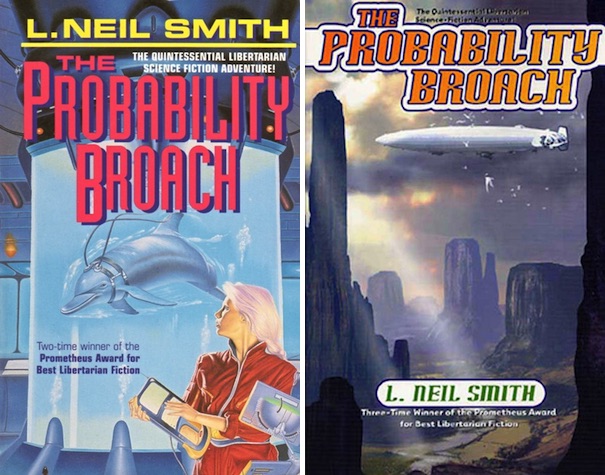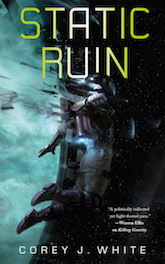In this bi-weekly series reviewing classic science fiction and fantasy books, Alan Brown looks at the front lines and frontiers of the field; books about soldiers and spacers, scientists and engineers, explorers and adventurers. Stories full of what Shakespeare used to refer to as “alarums and excursions”: battles, chases, clashes, and the stuff of excitement.
Today, we’re going to look back at the work of L. Neil Smith, an author whose fiction is full of “alarums and excursions.” The Probability Broach was his first novel, published by Del Rey books in 1980. The book takes its main character, a police detective named Win Bear, out of a dystopia with an oppressive government and thrusts him into an exciting alternate world that has very nearly dispensed with government altogether. Smith’s writing voice is witty, snarky, and entertaining, and there is always plenty of action to keep the story moving.
Of course, L. Neil Smith isn’t just an author known for writing alternate histories (and a trilogy of books about Star Wars character Lando Calrissian), but also for the political bent of his fiction. From the earliest days of Jules Verne and H. G. Wells, science fiction has been a literature of ideas, and often a home to stories with a political message. One of the most prevalent strains of political thought running through science fiction reflects the philosophies traditionally associated with libertarianism. Even readers who do not subscribe to libertarian beliefs may admit that the tenets of personal freedom and individual autonomy—and the occasional touch of anarchy, with characters armed to the teeth and free from legal restrictions—make fertile ground for fictional adventures.
In the early 1980s, I worked in a variety of jobs in Washington, D.C., and it was here that I encountered Smith’s work. During that time, spending an evening here and there reading a book set in worlds of free-wheeling anarchy was often a refreshing break from the sluggish bureaucracy I worked in during the days. While I am a political centrist myself, I always enjoy reading works that advocate different points of view, especially when they do so in an entertaining manner. The copy I read for this review is a trade paperback edition reprinted by Tor/Orb Books in 2001.
About the Author
L. Neil Smith (born in 1946), is an American science fiction writer who first appeared in print with a paperback original, The Probability Broach, in 1980. This novel introduced readers to his tales of the North American Confederacy, a parallel world where a much looser libertarian government emerged out of the American Revolution. The earlier books take place within our solar system, while subsequent books extend the reach of this civilization out into the stars and feature encounters with alien races. The books are notable for the aforementioned heavy doses of libertarian philosophy, but also for Smith’s wit and ability to write absorbing action sequences. The North American Confederacy books include The Probability Broach, The Venus Belt, Their Majesties’ Bucketeers, The Nagasaki Vector, Tom Paine Maru, The Gallatin Divergence, Brightsuit MacBear, Taflak Lysandra, and The American Zone.
After The Empire Strikes Back hit theaters, Smith was selected to write three tie-in novels that detailed the early adventures of Lando Calrissian before he met Han Solo: Lando Calrissian and the Mindharp of Sharu, Lando Calrissian and the Flamewind of Oseon, and Lando Calrissian and the Starcave of ThonBoka. The adventures in these three books received some additional attention recently when they were mentioned by the character Lando while dictating his memoirs in Solo: A Star Wars Story.
Other books by Smith that do not fit into his North American Confederacy universe include The Wardove, a post-apocalyptic novel, The Crystal Empire, an alternate history which non-European cultures emerge as the dominant powers in the world following the Black Death, and two adventures featuring pirates in space, Henry Martyn and Bretta Martyn, which quite strongly evoke the works of Raphael Sabatini. While Smith sometimes writes at shorter lengths, the majority of his published works have been novels.
Smith’s fiction has often been recognized by various libertarian science fiction literary awards, and The Probability Broach won the Prometheus Award for Best Libertarian SF Novel in 1982.
The Probability Broach

Edward William Bear, or Win, is a homicide Lieutenant in the Denver Police Department of a United States that is not quite the same as our own nation. In this United States, some of the disturbing trends of the 1970s have gotten worse. There are constant budget shortfalls, economic stagnation, and energy shortages. A fascistic Federal Security police force enforces laws nationwide, and ordinary citizens are required to carry travel papers. Win is an ‘everyman’ kind of a guy, short, balding, a little heavier than he wants to be, just doing his best to struggle through life. He is called to a crime scene and finds a college physics professor, Vaughn Meiss, gunned down on a street. The man has a strange gold coin in his pocket, along with a card stating he is a member of the Colorado Propertarian Party.
Win visits the Propertarian Party headquarters to find a group of intellectual idealists who talk to him about their philosophies, espousing positions on property rights, anarchy, and limited government. Their leader, Jenny, gives him a book on their principles and urges him to read it. Win returns to work and his boss, Mac, tells him the Feds want him off the case. Shortly thereafter, Mac is murdered in the parking lot. Win returns home to find his apartment wired with a bomb, which he defuses. He decides to visit the university to find out what Meiss was working on, and why it’s led to so many deaths.
Win meets Doctor Bealls, who reluctantly takes him to Meiss’ laboratory. While Win is checking it out, he is attacked again—there is an explosion, and when he regains consciousness, he finds himself lying in the middle of a lawn. At first, he thinks he was thrown out of the building by the explosion, but soon realizes that he is now in a whole new world, and guesses that he has traveled through time into the future. Every person he encounters is armed, and when he finds a phone booth, it contains a terminal that is like nothing he has ever seen before. The operator doesn’t even know what the city of Denver is, but mentions colonies on the moon and asteroids. He is connected with an online directory, and while looking through it, he comes upon a listing for Edward W. Bear with a nearby address and the title “Consulting Detective.” He sets out to visit himself, only to have a passing hovercraft fire upon him; he is grievously wounded.
When Win awakens again, he is in bed being treated by a beautiful medic, Clarissa, who brings capabilities exceeding those of our own most advanced hospitals into people’s homes. He meets an elderly neighbor, Lucy, and then he comes face to face with his twin from this world, Ed. And as they talk about their worlds, Win realizes that this is not the future—it is an alternate world, where the Whiskey Rebellion was a success, George Washington was executed as a traitor, and the Constitution thrown out and replaced by a loose confederacy. This confederacy had banned slavery, which prevented the Civil War, and soon spread to encompass the whole continent, becoming known as the North American Confederacy. Its volunteers fought against dwindling bastions of autocracy around the time of our World War One, and when the Russian Czar fell in the 1950s, libertarian ideals swept away all the world’s previous forms of government. Because there are no pesky taxes or regulations, technology has evolved far beyond what you see in our world, with fusion-powered zeppelins crossing the skies, hovercrafts replacing cars, rockets taking settlers throughout the solar system, and prosperity everywhere. People have discovered that simians and porpoises were more intelligent than previously thought, found ways to allow them to communicate, and granted them citizenship.
Buy the Book


Static Ruin
Of course, this would be a pretty short and boring book unless there was a fly in the utopian ointment, and those folks who’ve been trying to assassinate Win are the flies in question. The technology that allowed Win to travel between alternate worlds was not destroyed by the explosion when he passed through, and thugs of the Federal Security Police have reached out to dissidents in this new world to foment trouble. These dissidents are known as Hamiltonians, and cling to the ideals of a strong Federal government that Alexander Hamilton so vigorously espoused before people came to their senses. The Hamiltonians not only support strong central government, but believe that they are the best ones to be in charge of it.
I won’t go into all the details here, but the rest of the book pits Win and his new friends against those forces of autocracy, with lots of gunfire, kidnapping, spying, break-ins, and even an extremely rare convening of the Confederacy’s congress to address the crisis. We even get a moment where a character argues that the right to bear arms should of course cover all weapons, right up to atomic bombs. Smith does a great job of evoking the feel of a comic book with his prose (and as a comic book reader, I mean that as a compliment). The plot moves at a breakneck speed, everything feels heightened and exaggerated, and there is a sense of fun and excitement throughout—so much so that you almost don’t notice those obvious nuggets of philosophy interspersed with the adventure.
I would definitely recommend this book to readers unfamiliar with Smith’s work. If you enjoy it, you have a whole series of adventures in a similar vein that you can also read, and the narratives take his North American Confederacy and its ideals out into the solar system, to other stars, and even to encounters with alien races.
Final Thoughts
For a first novel, The Probability Broach is remarkably well crafted. Smith’s ability to tell a good story, and tell it in an entertaining way, serves him well, and allows him to advocate the ideas he holds so passionately.
And now it’s your turn to comment. What are your thoughts on The Probability Broach and Smith’s other works? If you read them, did you enjoy them as much as I did?
Alan Brown has been a science fiction fan for over five decades, especially fiction that deals with science, military matters, exploration and adventure.











I can’t offer opinions on the book as I haven’t read it, though I am fond of F. Paul Wilson’s LaNague books (which did have UK editions). I do enjoy the fact that when this book was written, Alexander Hamilton appears to have been a figure the average reader half-remembered from school history, rather than the protagonist of a major Broadway musical.
Smith is as inventive as all get-out and writes a good yarn, but it would be nice if the polemic was occasionally toned down, or at least targeted at something other than strawmen.
You certainly can’t accuse him of hiding his biases, though!
@1 I do enjoy the fact that when this book was written, Alexander Hamilton appears to have been a figure the average reader half-remembered from school history
“His enemies destroyed his rep, America forgot him” (and, apparently, now he’s the villain in this history!)
I enjoyed Probability Broach- I haven’t read much else of Smith’s work. I loved the list of Presidents NAC leaders that included Native Americans and simians. I also liked the in-jokes between worlds.
I enjoyed this book when I first read it (probably as a young teen) and re-visiting it as an adult I found it nearly as enjoyable, especially since I had learned more about American history in the intervening years. But this was to be the last LNS book that I would enjoy. I’ve read the Star Wars tie in novels but don’t remember anything about them except the title Mindharp of Sharu. And any in the series beyond the first book were just too heavy handed for me, and I was in love with even preachy Heinlein!
I seem to remember one novel (Pallas maybe) where LNS basically predicted the invention of the 3d printed gun and thinking at the time how it was be a terrible invention if brought into the modern world.
@1 I was thinking about Hamilton myself as I read the book, and how it is impacting on the thinking of the younger generation. I doubt my granddaughter, who knows every word of the musical, would buy into the concept of Hamilton as a purveyor of bad ideas.
I have his “The Crystal Empire” on a list of books to keep a lookout for in 2nd-hand shops. Apparently it does a great take on alternative Aztec history.
“The Hamiltonians not only support strong central government, but believe that they are the best ones to be in charge of it.”
Two ideals that are found together more often than not, I suspect…
Minor quibble: Your article’s headline is a bit mis-leading. In the Probability Broach ‘verse, it’s not that there are no rules (there are quite a number of them, violations of which are met with appropriate responses), it’s that there are no *rulers*.
Absolutely one of my favorite books! I’ve re-read it many times and own 2 paperback copies as well as the Graphic Novel version. I’ve also read most of the rest of the books in that series multiple times. Like you I first came across it about 1980. I was in the Air Force and stationed in England. Found it in the base bookstore. I’d been a Sci Fi fan all my life and began my transition to Libertarian thinking (though I didn’t have a name for it) many years before, reading Heinlein, among others. But here was a book that actually explained how a nation could function with next to no Government. It answered all the common questions and even some of the not so common and was “edge of your seat” entertaining, in to the bargain! I’ve been a life long L. Neil Smith fan, ever since. P.S. What caught my eye, that day in the bookstore, was the picture of a Gorilla in a Serape wielding a pistol like a gavel in front of a podium… that was just TOO intriguing to pass up! LOL
L. Neil Smith has announced a new book in this series, The Frozen Stars (I will add that this review is linked on his “Letters to the Editor” page).
@10: I see no compelling reason why said image should not be posted:
I’ve greatly enjoyed most of Smith’s books, with “The American Zone” being the only clunker. The review of the “Probability Broach” was accurate. Will look forward to reading “The Frozen Stars” when it comes out.
Even after I read Probability Broach, I didn’t know much about Hamilton. Years later I read his proposal to the Constitutional Convention, which Madison gives, in full, in his notes of the Convention. And you know what? Neil described his politics quite accurately.
Check it out. It’s a rather obscure bit of American history that’s worth knowing.
A couple more thoughts…
I liked at the time that the protagonist was Native and that a major supporting character is a crotchety old lady. Smith’s writing inspiration shows maybe a bit too much (IIRC, Dejah Thoris from Barsoom and Clarissa MacDougall from Lensmen appear only lightly changed, and Lucy Kropotkin is basically senior citizen Robert Heinlein in drag) but that also means that the pace doesn’t slow down and even the infodumps are easily swallowed.
I wish Smith had stuck to this formula.
I really enjoyed these books 40 years or more ago… but I got both more cynical and less. I no longer believe that people (in general) will do the right thing through “enlightened self interest” but I do think societies can encourage them to do the right thing: and governments are a significant factor in such societies.
Like @2, I started to find the polemics just a bit too much.
A great book explaining the virtues of true capitalism. A world where crony capitalism and it’s representative, the corporation don’t and cannot exist. No lobbyists either for that matter. What purpose would they serve? Who would they represent? Slavery abolished early on was Madison’s dream, but even in his later years he had not the courage to support it publicly. Separation of government and all economic activity. Just don’t use coercion on others. Beautiful!
I read this book once but don’t recall it well. The first Smith I read, and only one I re-read, was Tom Paine Maru, which somehow pointed 13 year old me at the Libertarian Party, shaping my politics for the next 15 years until I got better. Smith is at least an entertainingly gonzo writer, brimming over with ideas, good or bad: TPM had smartmatter suits and ships, brain implants, trilateral aliens with three sexes, lost colony worlds via time-shifting drive, giant space viruses (uhhh…), talking apes/dolphins/coyote, a kind of cool primitive spacecraft, tachyon FTL drive, fairly memorable characters, and the politics… which in TPM managed to string a young me along for a while as to whether it was white/back or shades of gray. It blew me away.
Now, well, a lot of it seems rather laughable.
The Probability Broach was my first exposure to what I have come to think of as the Standard Libertarian Paradise: upscale suburbia with flying cars, lots of guns and the New Libertarian Men to inhabit it. Fairly entertaining.